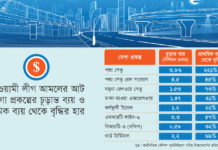
The government has granted clemency to the two controversial brothers, Haris Ahmed and Anis Ahmed, who had been facing life sentence. Haris was convicted in two murder cases and Anis in one. The home ministry had actually issued a gazette notification on 28 March 2019, pardoning them from their sentences.
In the recent news documentary, ‘All the Prime Minister’s Men,’ aired by the Qatar-based television channel Al-Jazeera, these two brothers were referred to as fugitive convicts. In Bangladesh too, up until yesterday, everyone knew them to be convicts on the run. But Prothom Alo investigations have proven otherwise.
The German-based media outlet Deutsche Welle had invited Gowher Rizvi, the prime minister’s international affairs advisor, to the talk show ‘Conflict Zone’. During the talk show, among other things, it was mentioned that these two fugitive brothers had been seen openly attending an event in the country.
General Aziz Ahmed was appointed army chief on 25 June 2018. Just a month before that, on 27 May 2018, Josef was pardoned from his sentence. And nine months later, a circular was issued granting clemency to Haris and Anis too. They were pardoned from their life sentences under Section 401 of the Code of Criminal Procedure. Section 401(1) of the code states that “when any person has been sentenced to punishment for an offence, the Government may at any time without conditions or upon any conditions which the persons sentenced accepts, suspend the execution of his sentence or remit the whole or any part of the punishment to which he has been sentenced.”
According to sources in the home ministry, on the very day that the home ministry issued the gazette notification granting them clemency, copies of this were sent to two separate speedy trial tribunals in Dhaka. These two magistrate courts had passed the sentence on the accused. Court sources said that after receiving the circular, the court sent orders to the Mohammedpur and Kotwali police stations to revoke the arrest warrants against Haris Ahmed and Anis Ahmed.
The circular stated that, by power of Section 401 of the Code of Criminal Procedure, victims of political vengeance Haris Ahmed and Anis Ahmed had been pardoned from the life sentences that had been passed in a conspiratorial, planned, framed and fabricated case.
Pardoning a fugitive criminal amounts to unlawful use of authority and misuse of power
Copies of this gazette notification were sent to the principal secretary of the prime minister’s office, the law secretary, the inspector general of police, the personal secretary of the home minister and the secretary of the home ministry’s security services division. This gazette notification has remained a secret though it was sent to so many government offices nearly two years ago.
When asked about the matter of granting clemency to Haris Ahmed and Anis Ahmed, Dhaka’s Speedy Trial Tribunal-3 public prosecutor (PP) Mahbubur Rahman on Monday told Prothom Alo, “Nothing can be said without checking the files.” Dhaka’s Speedy Trial Tribunal-4 PP Abdul Quader said the same. These two courts had sentenced Haris Ahmed and Anis Ahmed to life imprisonment.
Law minister Anisul Haque, when asked, also told Prothom Alo over mobile phone on Monday, “I do not know if anyone’s sentence has been pardoned. I have no idea about the matter.”
Supreme Court lawyer Shahdeen Malik told Prothom Alo that no fugitive criminal can enjoy any sort of legal privileges or rights. If any fugitive is pardoned under the Criminal Code of Procedure, that will be completely illegal. This is a clear provision of the law. He said that if anyone violates the law and takes steps to grant pardon, then in accordance to the law, departmental or administrative action can be taken against him or them. After all, pardoning a fugitive criminal amounts to unlawful use of authority and misuse of power.
However, law minister Anisul Haque told Prothom Alo there is no obligation for the accused to remain present to be pardoned under Section 401 of the criminal code. On Monday evening, Haris Ahmed’s name was still on the ‘wanted’ list on the Bangladesh Police’s website.
Businessman of Mohammedpur, Mustafizur Rahman, was shot dead on 7 May 1996. Police issued charge sheet against Haris Ahmed, Anis Ahmed and Tofail Ahmed alias Josef in this case. On 25 May 2004, Dhaka’s Speedy Trial Tribunal-3 announced the verdict in this case. In the verdict, the court sentenced Josef and a certain Masud to death. And three fugitive accused, including Haris Ahmed and Anis Ahmed, were sentenced to life imprisonment.
According to the case details, Josef appealed from jail against this verdict of the magistrate court. Haris Ahmed and Anis Ahmed could not appeal as they were in hiding. It was on 20 September 2007, during the caretaker government, that the High Court passed its rule following the death reference and hearing of the appeals. The sentences against Tofail Ahmed Josef and the other accused, Kabil, were upheld. Masud, who had been sentenced to death, was acquitted.
Josef and Kabil appealed against the High Court verdict. During the term of the present government, the Appellate Division gave its verdict on 9 December 2015 where Josef’s death sentence was commuted to life sentence. Kabil was acquitted. The next year, 2016, Josef’s mother appealed to the president for him to be pardoned. In 2018 the president pardoned him and he was released from jail. In was on 28 March 2019 that the government issued a circular pardoning Haris Ahmed and Anis Ahmed in this case.
One person did appeal to us to be pardoned from life-term. I cannot remember his name. The honorable president granted the appeal. Another declared himself a mental patient. The honorable president said he could go abroad for treatment. That is all I remember
Haris and Josef sentenced for killing Abu Morshed
Dhaka University student Abu Morshed on 25 September 1995 was attacked on the premises of Dhaka’s judge court. He had gone that day to appear in court in a murder case. He was shot in front of Dhaka’s Bar Council building. He was taken to Dhaka Medical College Hospital where he died after 7 days on 2 October.
Morshed’s father, lawyer Azizullah Bhuiyan, filed a case in this regard with the Kotwali police station. The police submitted charge sheet against right persons including Haris Ahmed and Tofail Ahmed Josef in this case in 11 April 1997 during the Awami League government tenure. Two others were named in a supplementary charge sheet the next year. On 4 October 1999, trial against these 10 accused began. On 10 August 2003, the case was sent to Dhaka’s Speedy Trial Tribunal-4.
Records show that during the hearing the defence claimed that the Morshed had been accused in the Babu murder case in Mohammedpur. Josef and others were witnesses in that case. They claimed they had been made accused in the Morshed murder as part of enmity against them.
However, on his death bed, on 27 September 1995, Morshed had made a deposition to the magistrate. He said that Haris, Mamun, Munna, Paris and Shaheen had surrounded him at the Dhaka Bar Council gate. Josef and Mamun shot him. On 3 March 2004, the court passed its verdict in this case, sentencing Josef and Tariq Saif alias Mamun to death. Haris Ahmed, Islam alias Munna, Ashanuzzaman alias Paris and Shaheen were sentenced to life imprisonment. Shoheb, Badal and Faruk were acquitted. Anis Ahmed was not accused in this case.
The court verdict declared that the accused had been sentenced on the basis of all evidence including the statement of the victim on his death bed.
Haris Ahmed did not appeal against this case. Yet the 28 March 2019 circular of the home ministry even pardoned him from this sentence.
When asked about the matter, home minister Asaduzzaman Khan told Prothom Alo over mobile phone on Monday night, “I know nothing about them (Haris Ahmed and Anis Ahmed) being pardoned. I cannot say anything without knowing about it.” However, he did say, “One person did appeal to us to be pardoned from life-term. I cannot remember his name. The honorable president granted the appeal. Another declared himself a mental patient. The honorable president said he could go abroad for treatment. That is all I remember.”
As to whether a fugitive criminal can get legal rights, the home minister said, “A fugitive criminal does not get any legal rights. He will have to surrender to get legal rights.”









